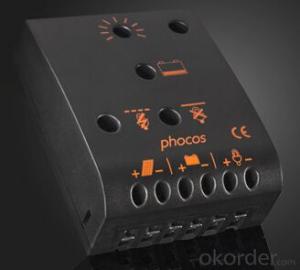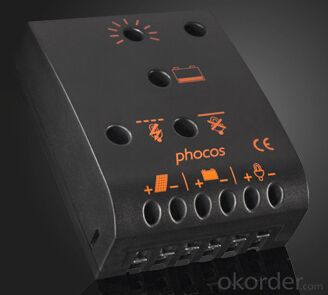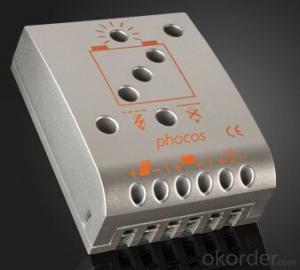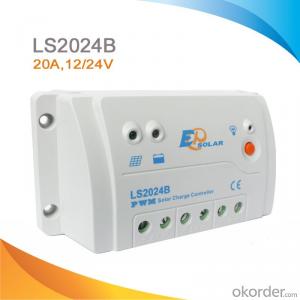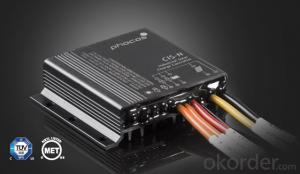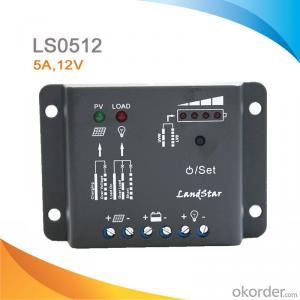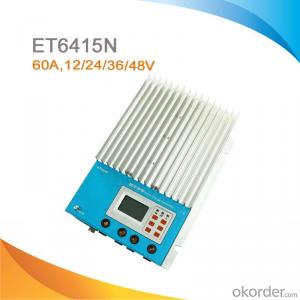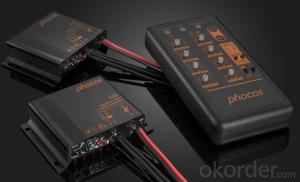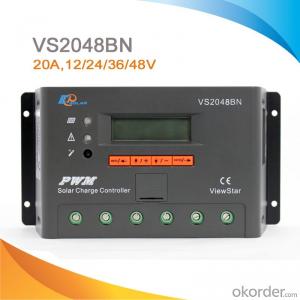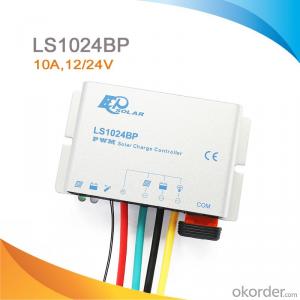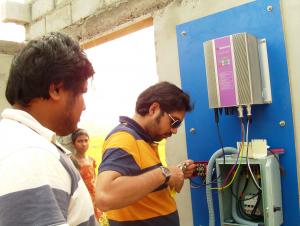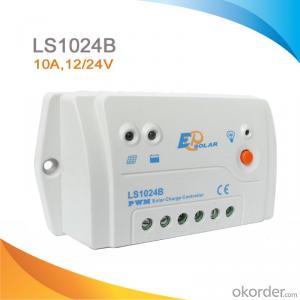12V CA Series (6-14A) Solar Charge Controller
- Loading Port:
- China Main Port
- Payment Terms:
- TT OR LC
- Min Order Qty:
- -
- Supply Capability:
- 10000 unit/month
OKorder Service Pledge
OKorder Financial Service
You Might Also Like
· Electronically regulated charging regime: Boost and float charge
· Deep discharge protection
· PWM series regulation, no panel short circuit
· Integrated temperature compensation
· Fully electronically protected:
·
Panel surge voltage
·
Wrong polarity at panel or battery
·
Overload and short circuit at load
· 3 LED indications: Charge Status, SOC, LVD, Overload! Short Circuit
· Common positive allows grounding
· The new version of CA solar charge controller series is especially designed for small solar systems with the need of a low battery disconnect feature.
· Main differences to the preceding CA series:
· The regulation circuit provides now series regulation to prevent single cell overheat problems of short-circuited solar panels. The terminal section has been replaced by a rugged, well profen 16 mm2 terminal block.
· The melting fuse of the predecessor has been replaced by a fully electronically protected circuit.
· 2 LEDs and 1 Duo-LED to display charging in progress, battery SOC, load disconnect and overload status. Leisure and rural electrification systems are the typical applications for this product. It is a perfect solution for cost-sensitive systems which require state-of-the-art system management.
· The compact case is now similar to the well-known CML series.
- Q: How does a solar controller handle the protection against voltage fluctuations?
- A solar controller handles the protection against voltage fluctuations by constantly monitoring the voltage output from the solar panels. It ensures that the voltage is within a safe range and prevents any surges or drops that could potentially damage the connected batteries or other devices. The controller regulates the voltage by either diverting excess energy or increasing it if necessary, thereby providing a stable and consistent power supply.
- Q: Can a solar controller be used for both off-grid and grid-tied systems?
- No, a solar controller cannot be used for both off-grid and grid-tied systems. Off-grid systems require a solar controller to regulate the charge of batteries, whereas grid-tied systems do not require battery storage and therefore do not need a solar controller for this purpose. The functionalities and requirements of solar controllers vary depending on the specific system type.
- Q: How does a solar controller handle the protection against reverse polarity?
- A solar controller handles the protection against reverse polarity by incorporating diodes or solid-state devices that prevent the flow of current in the wrong direction. This ensures that the solar panels are protected from damage caused by incorrect wiring or improper installation.
- Q: Can a solar controller be used with a solar-powered boat or RV?
- Yes, a solar controller can be used with a solar-powered boat or RV. A solar controller regulates the flow of electricity from the solar panels to the battery, ensuring that the battery is charged efficiently and protected from overcharging. This is essential for maintaining the battery's lifespan and optimizing the performance of the solar system in both boats and RVs.
- Q: Can a solar controller be used with a solar-powered carport?
- Yes, a solar controller can be used with a solar-powered carport. A solar controller is responsible for regulating the flow of electricity from the solar panels to the carport's battery or electrical system. It ensures that the solar panels are charging the battery efficiently and protects from overcharging or damage. Therefore, a solar controller is an essential component in managing the solar power generated by a carport system.
- Q: How does a solar controller handle high voltage input from solar panels?
- The task of regulating the flow of electricity between solar panels and the battery bank or load falls on a solar controller, which is also known as a charge controller. To ensure the safety and efficiency of the system, the controller employs various mechanisms when dealing with high voltage input from solar panels. To begin with, a solar controller typically utilizes a maximum power point tracking (MPPT) algorithm. This algorithm enables the controller to constantly monitor the voltage and current of the solar panels, allowing it to track the maximum power output the panels can generate. By adjusting the operating point of the panels, the MPPT algorithm optimizes their energy harvesting capability, even when weather conditions change or partial shading occurs. This prevents any damage that might result from excessive voltage. Moreover, a solar controller incorporates different protective features to handle high voltage input. One of these features is a voltage regulator, which acts as a limiter for the voltage. Its purpose is to ensure that the voltage from the solar panels does not surpass a certain pre-determined value, usually the rated voltage of the battery bank or load. If the input voltage exceeds this limit, the controller automatically reduces it to a safe level before allowing it to reach the battery or load. Additionally, a solar controller may include over-voltage protection mechanisms. These mechanisms are designed to detect and respond to sudden spikes in voltage, such as those caused by lightning strikes or electrical surges. By promptly disconnecting the solar panels from the battery or load, the controller prevents any potential damage to the system. In conclusion, a solar controller effectively manages high voltage input from solar panels by utilizing the MPPT algorithm to optimize power output, employing a voltage regulator to maintain voltage within safe parameters, and incorporating protective features to prevent damage from over-voltage situations. These mechanisms ensure the safe and efficient operation of the solar energy system, maximizing energy harvesting while safeguarding the connected components.
- Q: What is the maximum power rating of a solar controller?
- The maximum power rating of a solar controller typically depends on its specific model and design. However, common solar controllers in the market today range from 10 to 60 amps, with power ratings ranging from 120-720 watts for 12V systems and 240-1440 watts for 24V systems. It's always important to check the specifications of a particular solar controller to determine its maximum power handling capability.
- Q: What is the maximum power consumption of a solar controller?
- The maximum power consumption of a solar controller typically depends on the specific model and its features. However, in general, the power consumption of a solar controller is relatively low, usually ranging from a few milliwatts to a few watts.
- Q: What are the main functions of a solar controller?
- The main functions of a solar controller, also known as a solar charge controller or a regulator, are to regulate the charging process of a solar panel system and protect the batteries from overcharging or discharging. 1. Charging Regulation: The solar controller ensures that the batteries are charged with the optimal amount of energy from the solar panels. It monitors the voltage and current of the solar panels and adjusts the charging parameters accordingly to maximize the charging efficiency. 2. Overcharge Protection: One of the crucial functions of a solar controller is to prevent overcharging of the batteries. When the batteries are fully charged, the controller diverts the excess energy from the solar panels to a dump load or stops the charging process altogether, thus safeguarding the batteries from damage caused by overcharging. 3. Battery Discharge Protection: The solar controller also prevents the batteries from discharging beyond a certain point. It monitors the battery voltage and automatically disconnects the load from the batteries if the voltage drops below a predefined threshold. This prevents excessive discharge, which can shorten the battery lifespan. 4. Load Control: Some solar controllers have the additional function of load control. They regulate the power output to connected loads, such as lights or appliances, ensuring that they receive the appropriate amount of power without draining the batteries excessively. 5. Monitoring and Display: Many solar controllers feature monitoring capabilities, displaying important information such as battery voltage, charging current, solar panel output, and system status. This allows users to easily monitor the performance of their solar system and make necessary adjustments if required. Overall, a solar controller plays a crucial role in ensuring the efficient and safe operation of a solar panel system, by regulating the charging process, protecting the batteries, and providing monitoring and control capabilities.
- Q: What is the maximum charging current of a solar controller?
- The maximum charging current of a solar controller varies depending on the specific model and capacity of the controller. It can range from a few amps to several tens of amps, allowing for efficient charging of batteries or power storage systems connected to the solar controller.
Send your message to us
12V CA Series (6-14A) Solar Charge Controller
- Loading Port:
- China Main Port
- Payment Terms:
- TT OR LC
- Min Order Qty:
- -
- Supply Capability:
- 10000 unit/month
OKorder Service Pledge
OKorder Financial Service
Similar products
Hot products
Hot Searches
Related keywords
